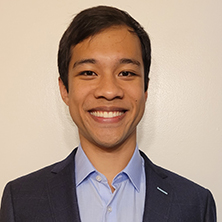Adventures in Employment - Timothy Tucker
 Timothy Tucker is a 3L day student at Seton Hall Law. During his tenure at the Law
School, he has worked in both the Essex County Prosecutor’s Office and the Burlington
County Prosecutor’s Office.
Timothy Tucker is a 3L day student at Seton Hall Law. During his tenure at the Law
School, he has worked in both the Essex County Prosecutor’s Office and the Burlington
County Prosecutor’s Office.
Why did you decide to go to law school?
My decision to attend law school was significantly influenced by my father, who is
an Administrative Law Judge. His commitment to helping others navigate through the
law deeply inspired me as a kid. Entering adulthood, I was drawn to a career that
would similarly allow me to serve the community, while also gaining experience in
the courtroom in front of judges and juries.
Have you always been interested in criminal law? What has inspired you to pursue criminal
law?
My passion for criminal law was ignited by films such as My Cousin Vinny, 12 Angry Men, and A Few Good Men. These movies highlighted the critical role of a lawyer in a criminal trial and underscored
the unpredictable nature of jury trials and how important it is for everyone to have
competent lawyers at the forefront of a case. Beyond cinematic influence, personal
connections with a few victims of violent crime deepened my understanding of the importance
of safeguarding the vulnerable. These experiences have taught me that the value of
practicing law extends beyond wealth and prestige. To me, the only fulfilling way
to practice law is to be in service to those in need.
You have experience working in a prosecutor’s office. What was it like? What were
some of the projects that you got to work on?
I was involved in various projects that broadened my understanding of the prosecutorial
role. Among these, my favorite tasks were related to the Grave's Act—dealing with
minimum sentencing for gun-related crimes—and Megan's Law, which involves categorizing
sex offenders within the registry. These cases resonated with me because they offered
the opportunity to represent the innocent and secure justice for crime victims.
Most valuably, I had numerous opportunities to address the court on the record. While I've always considered myself a skilled public speaker, standing before a judge and speaking on the record introduced a unique pressure I had not encountered before. Fortunately, I was accompanied by an experienced Assistant Prosecutor who provided guidance whenever I struggled to find my next words. This chance to speak on the record was crucial in overcoming the initial nerves every new lawyer first experiences when speaking on the record.
Did you see any interesting cases while working in a prosecutor’s office?
One memorable project involved a case where, unfortunately, the defendant's attorney
passed away during the trial. This unexpected event introduced numerous legal complications
into what would have otherwise been a straightforward case. This experience underscored
how there are never dull days as a trial attorney.
How did you decide that you wanted to be on the prosecution side of the law?
At the end of my first murder trial, I was deeply moved when the victim's family got
a chance to address the court. It was incredibly hard to listen to the heartbroken
words of loss and the void left by their loved one. Yet despite their misery, by the
trial's end, they found a sense of relief and were extremely grateful to the prosecutors
for helping them find closure and justice. I hope to have a similar impact on victims.
You have worked in two different prosecutor offices. How were they the same? How were
they different?
The main difference between the Prosecutor's Offices in Essex and Burlington lay in
their size; Essex had a large office with numerous attorneys, whereas Burlington's
office was smaller, with fewer attorneys. Despite these differences in scale, my experiences
in both locations were remarkably similar. Each office housed brilliant attorneys
who were readily available to mentor me.
How did you get your jobs in the two prosecutor offices?
In the spring semester of my second year of law school, friends, mentors, and professors
recommended that I apply to a Prosecutor's Office. During my interviews, I conveyed
a sincere enthusiasm for trial work and a readiness to learn. I hold my genuine interest
and willingness to engage with confidence as the reason the Assistant Prosecutors
decided to take a chance on me.
What do you hope to do after graduation?
I want to work in a Prosecutor's Office immediately after graduation and the bar exam.
Any advice for students interested in criminal law and/or working for a prosecutor’s
office?
1. A smile and a sympathetic ear can significantly impact someone going through what
may be the worst day of their life. The simple act of showing compassion can provide
immense comfort during such times.
2. It's important to maintain a friendly demeanor towards everyone involved, regardless
of our field's adversarial nature. Being professional and courteous doesn't necessitate
being cut-throat.
3. One unexpected lesson came when the sole of my dress shoe detached from the upper
part in the middle of the day, transforming it into something resembling a flip-flop.
Luckily, I did not have to appear before the court that day. That experience taught
me the value of always having a contingency plan.






